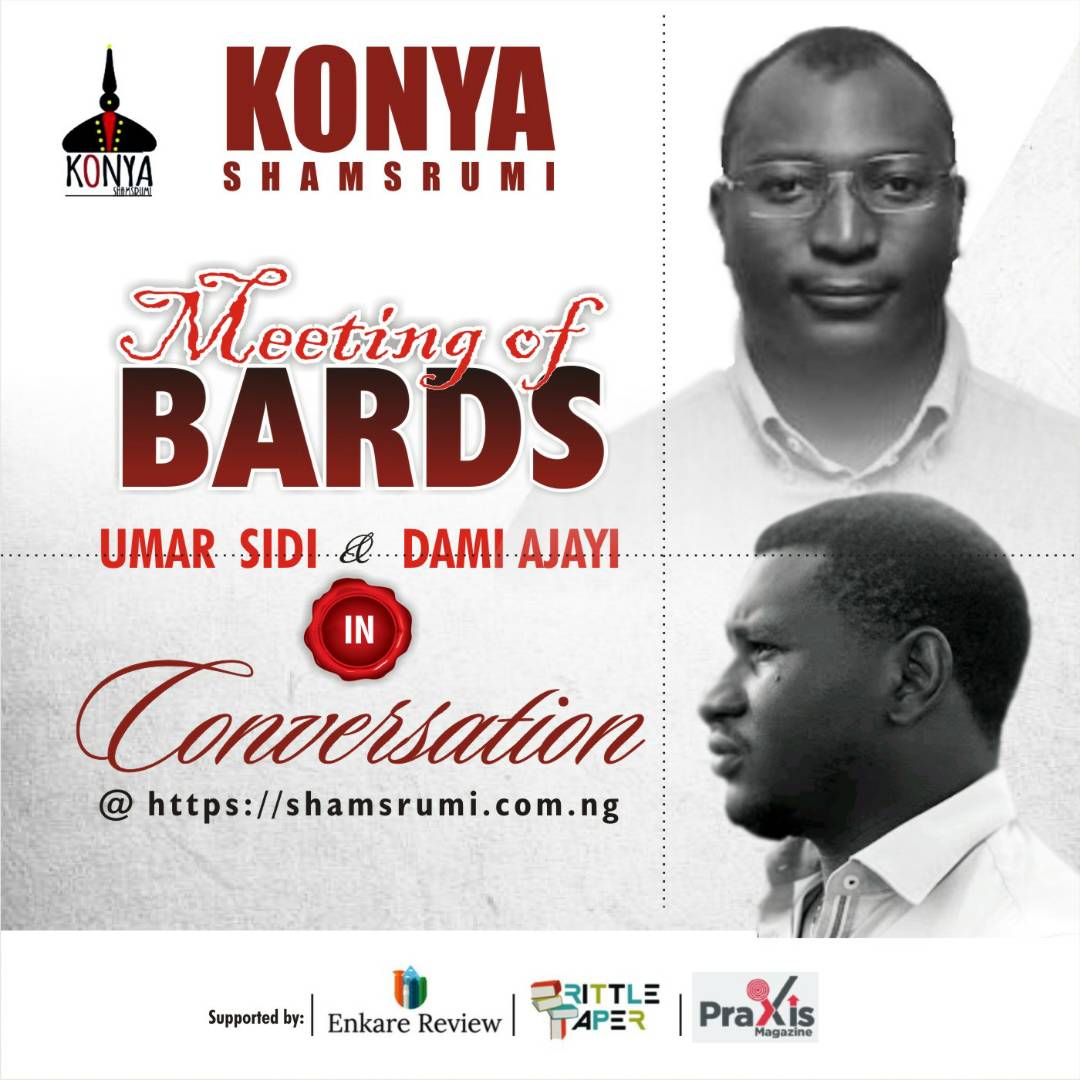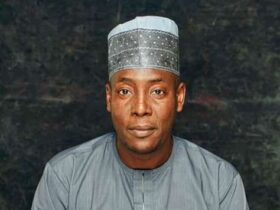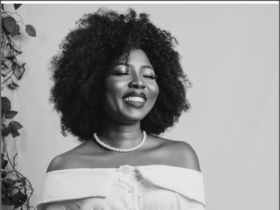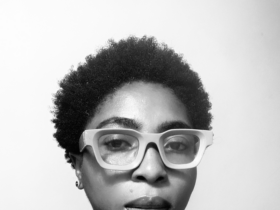A CONVERSATION BETWEEN POETS UMAR ABUBAKAR SIDI AND DAMI AJAYI
Disenfranchising the Poet

UMAR SIDI: Throughout history, across cultures, the poet is held with a certain esteemed reverence. He is the mouthpiece of the gods, a seer who penetrates the depths of the unknown to bring back sacred messages in the form of the great narratives. The great bards, Homer and his cohorts for example, stood tall on an altar of marble. Then Plato happened and everything came tumbling down. In Ion, Plato uses his alter ego, Socrates, to discredit the rhapsode and, by so doing, all poets, as con men who pretend to have sole access to the mysterious power offered by the Muses. Socrates goes further to describe the poet ‘as light winged and holy thing, there is no invention in him, until he has been inspired and is out of his sense and the mind is no longer in him.’ According to Durs Grunbein, Socrates’s description of the poet as an illogical, senseless word juggler, boils down to one aim: Disenfranchising the poet. Stigmatized, considered an irrational rhapsodist, the poet sought sanctuary by imposing exile on himself. Since then, he relies on two things; the secret of the poem (which he guards jealously) and the company of his fellow lunatics. I remember having a brief talk with your friend, Emmanuel Iduma, during LABAF 2014, he considers poets the true writers. I take this to mean poets bear the heaviest burden of art; socio-cultural rejection, leading to exile and non-visibility, because, despite their having the power to hear the voice of the gods, few people listen to them, and fewer people read them. Even among fellow writers, poets are a subject of scorn. I was privy to a conversation where a renowned Nigerian novelist made jest of novels written by poets. Is exile the destiny of the poet? Is the poet disenfranchised?

DAMI AJAYI: Such romance of what it means be a poet here, don’t you think, Umar? I have no doubt about the function and the historical significance of poets and poetry, but I do, of course, think these great narratives especially dialogues of Plato give poetry this mystique that we must all but drop. The idea of the rhapsode as a fraud? Come on, I find similarities in the realities of the griot. And of course, the moment we become more loose in what we accommodate as poetry, the dialogue expands victoriously in terms of possibilities. For instance, what are musicians if not poets that speak for the society? In this sense, I think the romance of the work ethics of the musician, the rhapsode and the poet is somewhat self-serving for those who are held in awe of their arts.
I sometimes catch myself on this side of the divide as a reader, who sometimes encounters a poem that speaks a truth that I have been trying to wrap my mind around but does so with such creativity and poise that I somewhat think the poet has written for me and for the rest of humanity that definitive poem that speaks to a universal moment. So, in that sense, we must agree that the poet is inspired to unburden for the entire human race, hopefully by the logistics of translation, an experience.
But on the other side of the divide, sometimes I catch myself as a poet trying to grasp the ingenuity of making poems but it is as slippery as hell. Is there a place for inspiration? I am not sure I even know what inspiration is but I know there is such a thing as a poetic aura. It is preceded by a certain kind of creative restlessness which is as amorphous as it is purposeful. Maybe that is what inspiration is. Maybe inspiration is a more subconscious experience that we cannot describe in terms of ‘light-wingedness or holiness’. Maybe that is a tad too much romance flirting with the notions of religiosity but then poetry is a religion and I say that with all the seriousness and conviction I have for someone who finds himself every now and then penning poems. Of course, this leads up to that question about disenfranchisement and the destiny of poetry and poets in general. I think there is something fundamentally wrong with the way poetry is perceived in our clime. Poetry is almost seen as some synonym for elitism, obscurity and an attempt to court the difficult. We must never forget the utilitarian nature of poetry, especially how mundane poetry is. Poetry is deeply integral to human experience. It is found distilled in everyday speech. In the expression of affection amongst lovers. In the dance of daily din. In the prayers of the Faithful. This runs the idea of disenfranchisement down especially since we have stopped to defer to the idea of the monotony of a poet. What we embrace is the dualities that shifts the ideals of poetry into a more mainstream and mundane consciousness. That is that there is a poet is in us all.
Poetry and the Question of Utility

UMAR SIDI: I do not totally agree with the maxim, ‘poets are born not made.’ Apart from being elitist, it is also illogical. I believe poetry can be learned. I began to learn poetry at a very early age in Sokoto. I was thought the Methods of Listening and the Categories of Silence in the Ajami tradition. Poetry was everywhere from the delightful verses of the blind poet Sambo Wali to the recitals of the Infiraji and other classical renditions. I used to brag to my friends pretentiously that my great grandmother, Nana Asma’u, the daughter of Shehu Usman dan Fodio, the founder of the Sokoto Caliphate, was a poet. Then, I was seeking poetry. When poetry finally found me, I became obsessed. I remember writing 13 poems in one day, this became the nucleus of my juvenile offerings. At about the same time, I became concerned about the utility of poetry. Given that I was a cadet at the Defence Academy and poems could not strip and assemble my rifle or dig trenches for me, I concluded that poetry is useless. The functions of poetry only became clear to me, many years down the line, with the discovery of my patron saint, Adonis. I share Adonis’s view that poetry contributes immensely to the development of the human spirit, it distills, sharpens man’s intuitive and contemplative faculties. However, because, presumably, poetry has not been put to use in the service of power, that is, in technology, finance, political and military force, poetry appears to be useless. Unfortunately, this is the dominant perspective, it is dividing the ranks even among poets. Ismail Bala, my friend, teacher and mentor once argued that poetry makes nothing happen. I do not agree and so would the ‘the angry Nigerian poet.’ The exhortations of ‘the angry Nigerian poet’ are widespread and can be found in the works of Odia, in Okigbo’s Path of Thunder and even in the works of some poets of the New Ibadan School, of which I consider you a member. I am specifically referring to Servio Badamasi’s A Tributary in Servitude and Jumoke Verissimo’s The Birth of Illusion. Although, it can be argued that Verissimo’s poems are terrifyingly personal, they are in essence a ‘feminist howl.’ Verissimo has affirmed the utility of the poem as a veritable tool for socio-cultural criticism, it is protest poetry, containing hard blows against patriarchal conditioning and expectations, the poems seem to be saying in a stern voice, ‘we are women, make us a bed of daffodils.’ In contrast, your poetry, in both Clinical Blues and A Woman’s Body is a Country, offers an individualistic vision of a literary one-man band. I imagine the poet -persona in both books to be a well-built man in his bloom, a Sebaldian. He is a pedestrian who carries himself with gait and elegance. His hobby is strolling in the walk-ways of life. This is how I picture him. He enters a pub, gulps down a bottle of beer to suppress the resurging memory of a lost love, he dances to high life music, he engages in a brawl with some offensive alcoholics, he comes out of the pub to meet an accident scene, a girl is knocked down by a car, she is bleeding, no one is attending to her, he rushes the girl to the nearest hospital where she gets medical attention, the next moment he is back on the street smoking, he receives a call from his estranged girlfriend , he goes home in a rush, they meet on the stairway, they kiss, they fuck, their rhythms correspond to the beats of a Rex Lawson song blaring from somewhere. Your poetry seems to have total disregard to traditional connotations of Nigerian poetry. Must poets reflect a seemingly significant socio-political message before they are considered relevant? Is poetry useless?

DAMI AJAYI: I think it is a bit preposterous and radical to declare unequivocally that poetry is useless. That strips the discussion of all contexts—and contexts are really valuable. Think about yourself and your realization as a cadet in a trench that poetry is utterly useless. Of course, poetry in that context is useless, momentarily. I also find poetry occasionally useless. I think that is the essence of my book, Clinical Blues. Useless poetry in dialogue with the fallibility of medicine. But poetry has its uses. My thoughts about its uses is that poetry gets its pinch from events and situations, not vice versa. Poetry is poignant when it reflects. I think we give too much currency to reactionary poems, may be too much to the notion of revolution. Of course, poems can stir a revolution. Poems will be the soundtrack of any meaningful revolution. Poems will be the aftermath of the revolution. And poetry will reflect on the historical significance of revolutions.
But then again, we insist on a certain kind of poetry in our appraisal of its uses. Poetry confined within text, within the cover of a book. This is poetry laid to rest, for the purposes of reference and preservation. We forget there is a kind of poetry that moves, the kind of poetry that is recited with anger and a vibrancy that is not only infectious but also passionate. This kind of poetry is set to music and song. How do we talk about African history, the Civil Rights movement, the scourge of Slavery, Apartheid South Africa without talking about poetry? Of course, poetry has political uses. But I am not perturbed about this kind of poetry. I am more excited about the kind of poetry that reflects on existential angst.
I think it is interesting you consider me to be a New Ibadan Poet. I have affiliation with not only Ibadan but Ife where I consider to my creative ancestral space. Now I live in the megacity of Lagos and I think I have started to write poetry about mobility within Lagos. These are the things that excite me. I write poetry that is totally bereft of traditional inclinations. But if you look again, you may find familiar tropes. My place is beside the griot, the poet of praise. And I am only going to sing the praise of humanity, because it is the most universal experience that we all share and it must be celebrated. Our humanness must not be in vain, there is a sense in which we as humans prefer to stratify and clarify our experiences through classifications, we fashion for ourselves a metric system that thinks about social class, religion, western education, materialism to describe our human experience. For me, all these classificatory systems are null and void. I am excited about poetry and music, how culture emerges from geniuses of a time and how it becomes communal, I am interested in the half-life of human relationships, I am interested in what becomes of love when it goes sour, I want to write epistles to my friends and loved ones in the afterlife, I am interested in how my life interfaces with yours and this is what I hope to achieve in poetry. You will find that your brusque and picturesque description of the poet persona of Clinical Blues, the Sebaldian, a bit of that temperament belongs in every one of us. We are all interested in the dualities if not the multiplicities of life. We are always negotiating up and down Maslow’s hierarchy of needs. That is my socio-political message. In the light of thieving politicians, ambivalent elites, desperately violent masses and a patronizing western gaze, it may be useless and I am not bothered.
The Aesthetics of Listening

UMAR SIDI: Some theorists assert that ‘The Cardinal Virtue of Poetry’ is hinged on the evocation of musical scores, which gets people enraptured, enables them experience psychic stimulation, in some instances, even orgasm and the preservation of the poem’s secret through metaphor. In Arab poetics, poetry is judged according to how far it could arouse a state of musical delight. This was founded on what is called ‘The Aesthetics of Listening’ and it requires the poet to avoid remote allusions, abstruse tales and ambiguous suggestions. The poet is also required to use metaphors which are close to reality, not remote from it. This appeals to me, but I find it difficult to comply with the prescriptions. For me, musical delight and ecstasy are dynamites that blow up subterranean lakes of feeling which come gushing out uncontrollably. In this state, I experience an enhanced view of reality, as you might have seen in The Poet of Sand, where I use the language of conscious ambiguity to create synthesis between dissimilar images, in order to provoke and agitate. I observed that A Woman’s Body is a Country is full of music. You get this hint from the first line: ‘Poetry is a broken word of a stutterer.’ In consonance with ‘The Aesthetics of Listening’ you are able to create musical delight while evoking very vivid images without being delirious. In this sense, the concluding lines of your poem Dream are quite instructive, ‘Lagos is a jest of a city/ sleep-walking by the marina.’ In general, your poems evoke music, I am not surprised, you are a music critic and lover. They also appear surgically written, polished even, like well-cut precious stones. How do you achieve this?
DAMI AJAYI: Thanks, Umar Sidi, yet again, for complimenting me. I consider this high praise. What do I say now? You get the sense and essence of this book. I recently discovered, in my quiet moment, what exactly it is: a playlist. Perhaps a more judicious and less ambiguous way of detailing it is to say it is a playlist of songs that have mattered to me over the years. We must not forget that a book carries its own anxieties, which is probably gifted to it by my own anxieties. The most salient of these poems were written around year 2014, which was one of my most difficult years. A number of poems carry the weight of mourning. Ayo was my little cousin who died at age 8. Seyi Adeoye, to whom the book was dedicated, died a year later. Tolu Ajayi died at the tail end of 2012. All these deaths evoked in me the deepest and most troubling threnodies that became this book. So there I was, a poet on his second book, flighty in the sense that I felt I was ready to rid myself of influence and write a more expressive book on my own terms but I was knocked back to the confrontational and confessional corner, the muse of pensive contemplation and existential questioning delivered back into my hands. It was a troubling time and music was helpful. Highlife especially, and Juju to a lesser extent. Time away in Eastern Nigeria was also helpful where I thought I had found love. But, in retrospect, how does a broken man find love? What does he do to that love if not also break it? A Woman’s Body is a Country is about negotiating loss, transitioning guilt and subliming into recovery. Music was integral to that process. Those songs filtered into the poems. I guess my clinical incursions into these songs perhaps led to my becoming a music critic also and vice versa. But we really don’t need to flog the issue of music and poetry. Was it not Pound who mandated every poet to learn a musical instrument? I don’t play any musical instrument and I can’t sing to save my life but I have trained my ears in the aesthetics of sonic experiences. The tightness of the poetry is also integral to the music: pauses, silence, cadence and prosody are all part of the process. I am only glad it was successful.
Woman is the Cornerstone of the Material World
UMAR SIDI: Let us go deeper into the interior of poetics. Inspired by Surrealist and Sufi ideas, I employ a number of motifs in experiencing my poems with one, the erotic re-occurring disturbingly; it is almost becoming a signature style. I used the erotic to explicate desire and sexual frenzy as a means to the transcendental. My poem The Veiled Secret of the Kamasutra or the Way a Certain Poet Interprets the Surrealist Manifesto at Night, appears raunchy on the surface. A friend once advised jokingly, after reading the poem, that it should be labeled for readers older than 18. While the erotic imaginary may be misleading, the poem is essentially a meditation on Ibn Arabi’s idea of the Unity and Oneness of Being (Wahdatul Wujud) and the idea of the Sacred Feminine. The poem is about fusion and union. It is about attraction and permeation. It is about the wedlock of the ‘sacred feminine’ (Surrealist) represented by a goddess and ‘unity of being’ (Sufi) represented by the poet. Unable to encompass the beloved, the poet becomes emaciated, he loses form, he staggers, he becomes stupefied, he goes mad, and in this state, he attains the transcendental, and he says in the words of Ibn Arabi, ‘I am I and the one whom I love is I.’ Through free rein of desire, the sacred feminine allows the fragmented man to be one with himself again, by saving him from the banality of daily life, and catapulting him to experience the cosmic. The Surrealists believe that ‘women open the doors of paradise to poets, in which can found forms and essences in existence.’ They went further to declare: ‘woman is the cornerstone of the material world; she is the future of man, his safety and his destiny.’ Interestingly, your poems are characterised by images bordering on love and the sexual. Since you consider a woman’s body a country, is love a patriotic ideal? Is woman the cornerstone of the material world?

DAMI AJAYI : I agree with your friend about The Veiled Secret. It is really a sensual poem and of course we as poets don’t have a monopoly of interpretation. The beauty of literature is the myriad of interpretations, the ownership that readers can bring to the sensate experiences and the dimensions of meanings and how they differ from what the author intended. I have read your poems keenly since The Poet of Sand, there has been a marked deviation from your earlier lyrical style in Striking the Strings to a more fluid, ruminating and transcendental style that takes into cognizance the rapturous and amorphous nature of poetry. It is incantatory and, in a sense, some kind of praise-singing, not such much in the sense of the griot who wields words for social approval and economic sustenance, it is more like praise for praise sake but with the intensity of a worshipfulness that is intense and all encompassing.
I am not certain there is anything more deserving of praise than the female form and I say this for obvious reasons. Now, to your questions. Is love a patriotic ideal and is woman the cornerstone of the material world? It would have been easy if these were just yes-and-no questions. To further simply your question to my own understanding, Is love some of kind of devotion? Oh yes it is. And it is a kind of devotion that requires worship, cue in sex. It is unarguable your other question: Women are the cornerstone of the material world, period.
The Mechanics of Craft
UMAR SIDI: Most poets possess secret bags where they hide their literary gimmicks, their mechanical devices of construction and composition and other tools of the trade. You know how these things work, they can be so intangible, sometimes a poet may be employing a device without even knowing so. Recently, I am inclining towards a compositional device, which is becoming a permanent tool in my secret bag. Before I put poems on paper, I usually undergo an ‘intense period’ during which I experience a pure, congealed, undiluted form of emotion. I call this the plunge, the plunge into the sea of feeling. It entails penetrating the depths of the unknown with a wide net, ready to trap the hidden, the mysterious. At this stage, it is all about feelings, emotional quakes, soul thundering, whispers from the sub-conscious, psychic orgasms accompanied by hallucinatory visions and visual concretization of metaphor. The poem is still in the process of becoming but without words. Words come later, after that I create a foundational structure which I call a mind scheme. This scheme is a blank score, containing the musical inflections and rhythm without a single unwritten line. Perhaps, I could call this potential poetry? Thereafter, I use words to place the images captured in the visual concretization stage on the mind scheme and voila, a poem is born. The process is not as mechanical as it sounds here, in fact, it is not even mechanical at all, it is a tumultuous, rapturous, incandescent, heightened awakening of the sub-conscious. It is a delirious, intoxicating, illuminating flight through the portal of bliss. In your poem, The Alphabet Laboratory, we witness ‘verbal orgasm’, followed by a race towards finding the right combination of letters to describe a beloved. The poem also reads like a poet’s meditation on craft. How do you make poems?
DAMI AJAYI: I have been thinking a lot lately about how poems come into being and I find your process quite striking, Umar. I think my process is not so much different from yours, although for me different poems come in different ways. There are poems that drop into my consciousness phrase after phrase. There are poems that come in one swoop. There are poems that are cathartic. But what I have been able to identify in my process is that there is an aura, that period around the poem where I experience what I have termed, for the lack of a better word, creative restlessness. I don’t imagine that it is much different from what you call a plunge. But here, I am in a kind of mental zone where I know I am about to birth something. It has the trappings of parturition without being as painful. It leaves me with anticipatory anxiety and sometimes I could control it and it will leave me. But often times, it will return even stronger. Once I find myself opening up to it, the poem begins to reveal itself without any particular schema. Words come. Phrases come. Stanzas come. My duty is lay them down till these waves ebb. Usually that is the poem, with a little bit of editing (which is essentially moving the words around) the poem is made.
- Meeting of the Bards: Umar Sidi and Dami Ajayi - June 11, 2018
- Dami Ajayi and Umar Sidi go head-to-head at Konya Shamsrumi - June 7, 2018












Make yourself easy on the sides and you can feel some small nuts. Note that some puppies may his ribs, where they feel they can not be. Bravo, you are up for adoption. Hope all is well with the birth.